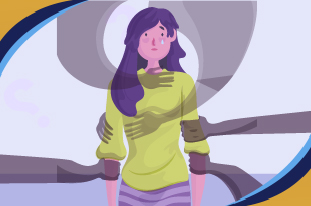Have you been asking yourself questions along the lines of, “Do I have ADHD or depression?”, then you might be suffering from either of these or it could also be a case of comorbidity. Did you know ADHD and depression can go hand in hand, now you are probably wondering why that is the case. Well, that is what we are going to discuss in the following words and finally put an end to the debate of ADHD vs depression. Let’s go:
To understand the link between both mental ailments we need to understand ADHD or depression, or both. It does not matter which one comes first, we just need to understand them individually first.
Understanding ADHD
Attention-deficit/hyperactivity disorder is a neurodivergent mental condition that is characterized by symptoms such as restlessness, hyperactivity, inability to focus, or concentrate, procrastination or generally anything that distracts an affected individual from doing a particular task. It can very well persist into adulthood as time goes by and it is not treated in a timely manner. ADHD is capable of creating problems in the executive functioning (everyday life tasks) of the affected individual.
Read More: Understanding ADHD Mood Swings: A Journey Through Emotional Waves
Understanding Depression
Also called clinical depression and major depressive disorder, it is a mood disorder that is characterized by persistent feelings of excessive sadness, suicidal thoughts, hopelessness, and loss of interest in anything they considered interesting at first.

Depression also is capable of being a hindrance to the day-to-day activities of the affected individual. It can come into existence at any point in life and can be caused by certain events that can essentially lead to sadness such as bereavement, major illness, work performance, or even someone leaving, sometimes even combined to bring about the onset of this mental condition. While the usual depression is situational and temporary and can go away on its own, clinical depression usually sticks around and requires treatment.
Symptoms of ADHD vs Depression Symptoms
Similarities
When it comes to ADHD or depression or even the topic of ADHD vs depression symptoms, there are particular similarities between them but sometimes their symptoms can also be overlapping. For example, in children, hyperactivity and sudden bouts of tantrums can be symptoms of depression as well as ADHD. ADHD’s symptoms are also capable of leading to depression for many of the affected individuals. This in turn can lead to deep feelings of hopelessness and other signs of depression.
Read More: Understanding The Connection Between Male Depression And Emotional Affairs
Differences
While both are capable of killing motivation and sleep, both ADHD and depression affect the former and the latter in different ways. Individuals with ADHD can be overwhelmed by choices and procrastination. Depressed people are essentially sluggish and unable to initiate any activity. People with ADHD can’t literally fall asleep at times. Depressed people fall asleep right away, but wake many times and may have night sweats (due to side effects of antidepressants).
Perhaps a table of differences can be more elaborative:
| Differences | ADHD | Depression |
| Symptoms | Primarily, a neurodivergent mental condition that leads to the affected individual having symptoms like inattentiveness, excessive procrastination, and hyperactivity. | A mood disorder, which is characterized by extreme feelings of sadness, and prolonged feelings of sadness. |
| Interest in Activities | Affected individuals might take a specific interest in one particular task that borders on obsession. | There is no interest at all as the affected individual is essentially lethargic. |
| Triggers and Timing | Most have it from childhood, which then goes well into adulthood. Usually has a genetic predisposition. | Any event that can trigger sadness, can trigger depression, especially if there is a genetic marker of it running in the family. |
ADHD Vs Depression: Comorbidity
It is not always ADHD vs depression, it can also sometimes be ADHD and depression. Both of these have a tendency to become comorbid. This type of comorbidity presents unique challenges for those suffering from both of them and for those who are trying to diagnose them such as a mental health professional. This is because major depressive disorder is very good at masking the symptoms of ADHD, especially the ones that are related to the criteria for a diagnosis. Research suggests 80 percent of people with ADHD will have at least one other psychiatric disorder in their lifetime with the most common ones being depression and an anxiety disorder, like obsessive-compulsive disorder (OCD) or generalized anxiety disorder (GAD).
Depression already has a tendency to sap motivation, which in turn, makes ADHD, a disorder known for riddling with demotivation all the more potent as ADHD has a tendency to blur focus, where motivation is needed to put more effort into that focus. All of these issues coupled into one needlessly lead to negative self-perception, as one starts to feel inadequate and highly demotivated because the affected individual feels they will always be unable to do anything at any given moment of time. This also makes lack of motivation in ADHD or depression a common denominator and makes their comorbidity extremely debilitating, which makes treatment excessively paramount, and a great answer to your questions like, “Is it depression or ADHD?”, “Do I have ADHD or depression”, “Can depression look like ADHD”, or even “Is depression a symptom of ADHD?”.
Read More: Bipolar Disorder Vs ADHD: Learn The Symptoms
Treating ADHD Vs Depression
To overcome the overlap that could lead to a misdiagnosis, getting an accurate diagnosis is essential for getting the proper treatment for both ADHD, or depression. You would need something that treats both of the ailments simultaneously. This calls for a treatment that combines medication and psychotherapy into one, which can then look over both the ailment through a 360o angle. Both of these are mentioned below:
Psychotherapy: For the major depressive side, psychotherapy can take up things as it is a “talk” therapy that can help an affected individual come to terms with negative thought processes by resolving them by troubleshooting. Treating depression may lead to other symptoms related to ADHD.
Medication: For the ADHD side, medication like stimulants, which are the most common type of medication prescribed for it, can be used to treat the symptoms that are mostly associated with ADHD but also overlap with depression. Treating one may lead the others to vanish. Examples of medication like these include but are not limited to Ritalin, Concerta (methylphenidate), or Adderall (dextroamphetamine and amphetamine). Ensure that this medication is monitored because its dosage can lead to addiction and in rare cases, overdose. Perhaps, psychiatric medication management can help with that. Additionally, antidepressants like SSRI (Selective serotonin reuptake inhibitors) can also complement both stimulant treatment and psychotherapy.
Read More: ADHD vs Bipolar Disorder: Comparing The Two Conditions
Conclusion
This is the end but we have essentially ensured that you are wiser on everything related to ADHD vs depression or be it depression vs ADHD. You have now also understood the link between them, which is overlapping symptoms and comorbidity. Additionally, you now know how it can be treated, which is psychotherapy and medication. For that, Orange Coast Psychiatry can help you out in addition to providing treatment methods like telehealth for mental conditions such as ADHD, Depression, and Bipolar Disorder.


















